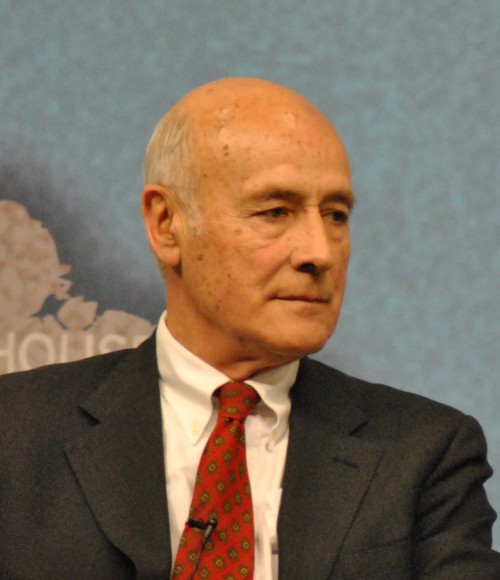 Joseph Nye Joseph Nye |
EMANUEL PASTREICH:
There is no doubt that China is the rising power in the world. And yet I wonder whether the inevitable competition between the United States and China necessarily has to end in a bitter confrontation. I think that such an anticipation is culturally based and no real basis in reality. How do you think the fates of the United States and of China will be interlinked? Do you think that good relations are critical to the United States maintaining its global position?
JOSEPH NYE:
China’s size and its high rate of economic growth will bring it closer to the United States in terms of the basic resources for influence over the next few decades. Such an evolution does not necessarily imply that China will surpass the U.S. as the most powerful country. Even if China were to suffer no major domestic political setbacks, many of the current projections for its future growth are simple linear extrapolations of current growth rates and those rates are likely to slow in the future. Moreover, looking only at economic projections can result in a one-dimensional understanding of power because one ignores the strengths of the U.S. military and American advantages interms of soft power. Also, we should not overlook China’s geopolitical disadvantages within the context of the internal Asian balance of power. China’s position is less favorable by comparison than America’s relations with regards to the Americas, Europe, Japan, India and other countries.
On the question of absolute decline, rather than relative American decline, the United States faces serious problems in such as debt, general access of the population to adequate secondary education, growing income inequality and political gridlock at home. Although these issues are important, they are ultimately only part of the picture. On the positive side of the ledger we can find favorable trends for the United States in terms of demography (not the serious aging of the population that we find in East Asia), technology (lead in research and the creation of new fields) and energy. And there are abiding factors that favor the United States such as its geographical location and its enduring entrepreneurial culture.
As an overall assessment, describing the 21st century as one of American decline is inaccurate and misleading. America has many problems, but it is not in absolute decline in the sense that the late Roman Empire was. The current trends suggest that the United States will remain more powerful than any single state in the coming several decades.
I think that ultimately the greatest challenges for the United States will not be that it is overtaken by China, or overwhelmed by some other contender. Rather the United States may well be faced with a complex landscape of power resources made up of both states and non-state actors that pose unprecedented challenges. The task for the United States increasingly will be to organize alliances and networks that can be mobilized to effectively address an increasing number of new transnational problems. And increasingly we will be challenged to organize such complex multilateral cooperation for their solution.
Contrary to the claims of some who proclaim this century the “Chinese century,” we do not see any signs of a post-American world. That said, although American leadership will continue, it will take a different form than it did in the 20th century. As I wrote some time ago, the paradox of American power is that although the United States has tremendous assets, unmatched in the world, nevertheless the only superpower cannot go it alone.
I do not think that China should make the mistakes that the United States made. For example, China should not be a free rider on global issues, benefiting from the global order but not actively contributing to it. The United States did so in the 1930s and it was a major error.
The American share of the world economy will be less in this century than it was in the middle of the past century. But the greater challenge will be responding effectively to the simple complexity of new challenges. That means newly emerging countries and a panoply of non-state actors. These new challenges will make it difficult for even the largest power to wield influence and organize action. In the end, I feel that rather than China, the greater challenge for the United States will be institutional entropy.
EMANUEL PASTREICH:
Why did you feel there was a need to affirm America's strengths at this particular moment? What are the reasons that some are led to underestimate America’s capabilities?
JOSEPH NYE:
In the 1990s, I wrote that the rapid rise of China could cause a global conflict similar to that described by Thucydides in his monumental study of the disastrous Peloponnesian War in ancient Greece. Thucydides concluded that the rise of Athen’s power instilled a fear in Sparta that set in motion an escalation of tensions and conflicts.
Today, I think that such a scenario of over overt conflict between China and the United States is unlikely in today’s environment. There are, however, analysts who insist that China cannot rise peacefully.
And then there are those who draw analogies to the geopolitical tensions that brought on World War I, specifically how Germany surpassing Britain in industrial power brought the order in Europe into question. In this respect Thucydides’ other warning is important to bear in mind: the belief in the inevitability of conflict can become one of its main causes. There is a possible scenario in which each side, believing it will end up at war with the other, makes reasonable military preparations in accordance with that assumption which then are read by the other side as confirmation of its worst fears. Such a vicious cycle can be set in motion.
An accurate assessment of power relations is essential to prevent miscalculations in policy. There remains a concern that as China grows more nationalistic, it faces the dangers of hubris. Similarly, there is a risk that the United States will overreact to fears of dangers posed by the rise of China and exacerbate the situation.
Fortunately, it is doubtful that China will have the military capability to pursue any overly ambitious dreams in the next several decades. Costs matter. It is easier to indulge one’s wish list for future expansion if you are looking at a menu with no prices attached. Thus, if Chinese leaders try to match the United States in any meaningful manner, they will have to contend with the reactions of other countries, as well as with the constraints created by their own objectives of continued economic growth and the pursuit of external markets and resources.
Thus I continue to welcome a peaceful rise for China and I believe that will thoughtful statesmanship serious conflicts can be avoided.
EMANUEL PASTREICH:
When we try to assess the US-China relationship, it is valuable to look back to the past, like the completion of Athens and Sparta, or the United States and Great Britain, or Great Britain and Germany. But it is also true that we are witnessing technological developments today that are simply unprecedented in human history. The advancement of computer processors at an exponential rate has transformed some aspects of international relations, and complicated the relationship of the United States with the world. This development cannot be found in history books because it has never happened before.
It appears that technology will not only determine wealth and power, but also transform the very nature of international relations.
JOSEPH NYE:
The US will likely maintain its technological lead for the next five to ten years, and probably beyond then. It is impossible to predict fifty years in the future. U.S. spending on research and development is currently about 2.9 percent of GDP, an amount exceeded only by the spending of South Korea, Japan and Germany. China and the European Union are closer to 2 percent of GDP. Equally significant is the strong entrepreneurial culture and the access to venture capital in the United States which pushes forward technological change.
EMANUEL PASTREICH:
I am not as optimistic about the United States and its prospects for the future in science and technology without radical reform. I worry that the overall level of competence is slowly dropping in relative and in absolute terms.
JOSEPH NYE:
If one looks at the technologies that are often cited as most transformative for this century we find generally that the United States remains at the forefront of new developments. This statement holds true for biotechnology, nanotechnology, and remains true for the next generation of information technology.
EMANUEL PASTREICH:
Some suggest that climate change is a game changer at multiple levels. First, the response to climate change will require a new level of engagement with the world as equals that the United States may find difficult. And secondly climate change means that the United States will suffer because the economy is too deeply invested in oil. Just as the United States was able to pull ahead of Britain because Britain was too deeply invested in coal in the last century, could it be that this time around that China will find it easier to move to solar and wind power because it is not as invested in oil?
Also it may be that the US military cannot make the shift as quickly to addressing the security challenge of climate change because it is so deeply invested in weapons of the past.
JOSEPH NYE:
I regard climate change as a very important issue. China is now the world’s largest emitter of CO2 and it has become the world’s largest oil importer. By the 2020s, the shale revolution may mean that North America will no longer be an energy importer. Much of the shale gas will be able to displace coal and oil which produce more greenhouse gases.
China also has massive shale resources, but it has been slower to exploit them. Overall the US is better placed than China to respond to climate change. That said, the challenge of climate change is going to require the cooperation of the United States, China, India and other nations. No one country will be able to solve this problem on its own, or to escape its consequences.
EMANUEL PASTREICH:
Although it may be true that US power will continue longer than many had anticipated, the "death of distance" that rapid technological development has brought about, to quote Frances Cairncross, is increasingly making China a big part of the United States economy itself, and a part of American corporations. Will not the future US be deeply integrated with China, perhaps to a degree unprecedented?
JOSEPH NYE:
The US and China are deeply entangled, and that state is largely a good thing. Deterrence of destructive military or cyber actions can rest on denial, punishment, or entanglement. China and the US would each suffer if they launched a nuclear strike, or took down each other’s electric grid. That discourages such drastic acts. In the economic realm as well, China cannot afford to dump its dollars onto world markets because such an act would hurt them.
Most Read
-
1
-
2
-
3
-
4
-
5
-
6
-
7





















